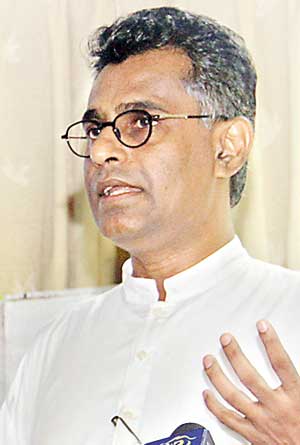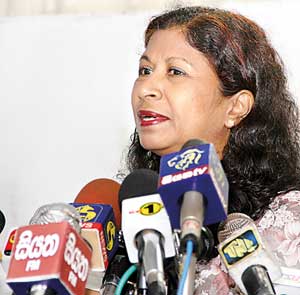Reply To:
Name - Reply Comment
Last Updated : 2024-04-27 00:40:00
.jpg)
_Late-City-DM-9.jpg) The 16-billion-dollar dairy giant Fonterra is under the global spotlight following the alleged contamination of its milk powder products with Dicyandiamide (DCD), and also the Botulinum toxin which causes Botulism, a disease which is fatal or causes paralysis and is produced by the Clostridium Bacterium.
The 16-billion-dollar dairy giant Fonterra is under the global spotlight following the alleged contamination of its milk powder products with Dicyandiamide (DCD), and also the Botulinum toxin which causes Botulism, a disease which is fatal or causes paralysis and is produced by the Clostridium Bacterium..jpg)
.jpg) Elaborating on the issue of the ban on imported milk which has been shrouded in controversy, member of the Government Medical Officer’s Association (GMOA) Dr. Nalinda Herath took the liberty of setting the record straight of some common misconceptions regarding this matter. Contrary to reports that Dicyandiamide (DCD) could be an operative cause of Botulism, a disease which could cause paralysis, Dr. Herath clarified that there was no such connection and two separate tests would have to be administered to identify DCD and the Botilinum Toxin which is the cause of Botulism, a sometimes fatal paralytic illness. Dr. Herath said that once the GMOA received a report from the Industrial Technology Institute (ITI) on the discovery of DCD in imported milk powder, immediately it held a meeting to address and resolve the issue and was startled by the response of the Ministry of Health. " The Health Ministry completely ignored the ITI report and kept making reference to the results of the tests conducted in Thailand." “The Health Ministry completely ignored the ITI report and kept making reference to the results of the tests conducted in Thailand. That test was taken to find the botilinum toxin and was never proven. Only after we wrote a letter to the Ministry of Health did the Director General of Health Services ban the milk powder, and that too based on the botulism test, not the DCD test. The Health Minister requested not to have any media statements without his permission, perhaps because he was embarrassed to admit that the ITI report was right,” he said. |
.jpg) The people of this country have been suffering from various diseases out of which Kidney diseases are the most common. Cancer, heart diseases and many such diseases are now commonplace among the masses of this country. It is pertinent to inquire into the causes of such diseases. It is of paramount importance to inquire as to the impact chemical additives used in making food and processing food has on the roots of these diseases.  The recent controversy regarding milk powder which contains DCD was first pronounced by the ITI. However, these findings were rejected initially and the companies concerned said that we are trying to portray something that is not true. We, however, stand by these findings and are willing to openly debate anyone or any authority regarding the findings of the ITI. The recent controversy regarding milk powder which contains DCD was first pronounced by the ITI. However, these findings were rejected initially and the companies concerned said that we are trying to portray something that is not true. We, however, stand by these findings and are willing to openly debate anyone or any authority regarding the findings of the ITI."We are speaking on behalf of the common masses, the population of this country who will suffer for generations as a result of the actions of the corporations and those who protect it" It is clear that Anchor and Maliban milk contain DCD and everyone who is trying to cover this up or promoting the agendas of these companies is committing a heinous crime on the population of this country. Many people have also said that we are trying to further a political ideology through this by way of trying to help local businesses. But there is no such agenda for us, we have our political ideologies but this is devoid of any such agenda. We are speaking on behalf of the common masses, the population of this country who will suffer for generations as a result of the actions of the corporations and those who protect it. Now China, Russia and other countries have banned certain products from these companies. We fear that these products might be brought and dumped on our innocent consumers. This is neither a political problem nor a professional issue but it’s the truth. There is the Food act and the Consumer Affairs Authorities Act which clearly specify that it is an offence to promote, import or sell anything which is harmful to the health of the consumer- and even in this instance it is a blatant violation of the act. |
.jpg) Most types of food must be processed to a certain extent if it is to be made fit for human consumption and to make digestible, however, this must be within reasonable constraints asserted Dr. Damayanthi Perera, while condemning the grave risks posed by Ultra Processed (UP) Foods and Genetically Modified (GM) foods. Highlighting the potential harms caused by these products, Dr. Perera pointed out that even in the extensive scrutiny processes; these products undergo veritable red flags as far as safety is concerned. “Some of these milk products are tested 300 times. If something needs to be tested that many times then it should not be consumed”. Dr. Perera stated that the harmfulness of these products was seldom brought to the attention of the consumer as a result of tactful advertising campaigns which depict the product to not only be safe but favourable for consumption. “Some of these milk products are tested 300 times. If something needs to be tested that many times then it should not be consumed”. “The advertisement culture should have a limit. In reality, it is nothing more than a ‘white collar bribe’ to  promote substandard products,” she said. promote substandard products,” she said.Speaking further on the role played by corporate giants in infringing consumer safety, Dr. Perera observed that multimillion dollar industries would invariably escape the full weight of liability to be borne even in the event of a violation. “Cadbury Chocolates in Britain contained ‘salmonella bacteria’ which is a germ found in our feces. However, Cadbury was asked to pay a meagre fine and was not made fully liable. So in light of these events, how do we as consumers protect ourselves?” In answer to this question, Dr. Perera said that we as Sri Lankans in order to combat a corporate bully need not look further than our local produce. “Lessening our demand and dependency on imported products is necessary, and we must deviate from this ‘brand’ or ‘branding’ culture and realise that the safest products are natural produces. There are pleas from the American people themselves asking for pasteurized milk as opposed to processed milk.” |
.jpg) DCD is applied as a fine particle suspension spray to grazed pastures to control nitrogen losses from cow urine patches. Here are some other DCD facts:
|
.jpg) Botulinum toxin is a protein and neurotoxin produced by the bacterium Clostridium botulinum. It is the most acutely toxic substance yet known. Botulinum toxin can cause botulism; a serious and life-threatening illness in humans and animals. The clinical syndrome of botulism can occur following ingestion of contaminated food, from colonisation of the infant gastrointestinal tract, or from a wound infection. |
.jpg) The issue is about whey protein and we want to make it clear that Fonterra Sri Lanka does not import any food which contains whey protein to Sri Lanka. All our products therefore are safe for consumers. We still stand by the test results regarding DCD in which it was specifically proved that our products do not contain DCD. The tests were carried out according to international research practices, and were done according to the directive of the Ministry of Health. Therefore, our products have been cleared and there is nothing for the local consumer to worry about when using our products. We have throughout our years in business adhered to the guidelines, directives and all other such arrangements given by the Ministry of Health and we will give them all necessary assistance and adhere to their guidelines. "We have throughout our years in business adhered to the guidelines, directives and all other such arrangements given by the Ministry of Health" |
.jpg) A fresh milk campaign is due to start within the next month; this is to be conducted with the collective efforts of the Agriculture Ministry, Economic Development Ministry the Health Ministry and the GMOA. The Health Minister is supportive of this campaign and even agreed to the GMOA’s further request to incorporate a Toxicology Centre in the Health Ministry itself.” |
.jpg)
nihal Thursday, 08 August 2013 08:10 AM
if a white couriered fair skinned foreign beautician in fashioned advertisement tells us to drink us poison, will do it...that's how this ad-business have changed our mind set.
padmasiri Friday, 09 August 2013 10:19 AM
Don't worry be happy "adambarakara Thaththa" is there to protect you.

Add comment
Comments will be edited (grammar, spelling and slang) and authorized at the discretion of Daily Mirror online. The website also has the right not to publish selected comments.
Reply To:
Name - Reply Comment
US authorities are currently reviewing the manifest of every cargo aboard MV
On March 26, a couple arriving from Thailand was arrested with 88 live animal
According to villagers from Naula-Moragolla out of 105 families 80 can afford
Is the situation in Sri Lanka so grim that locals harbour hope that they coul

7 hours ago
9 hours ago